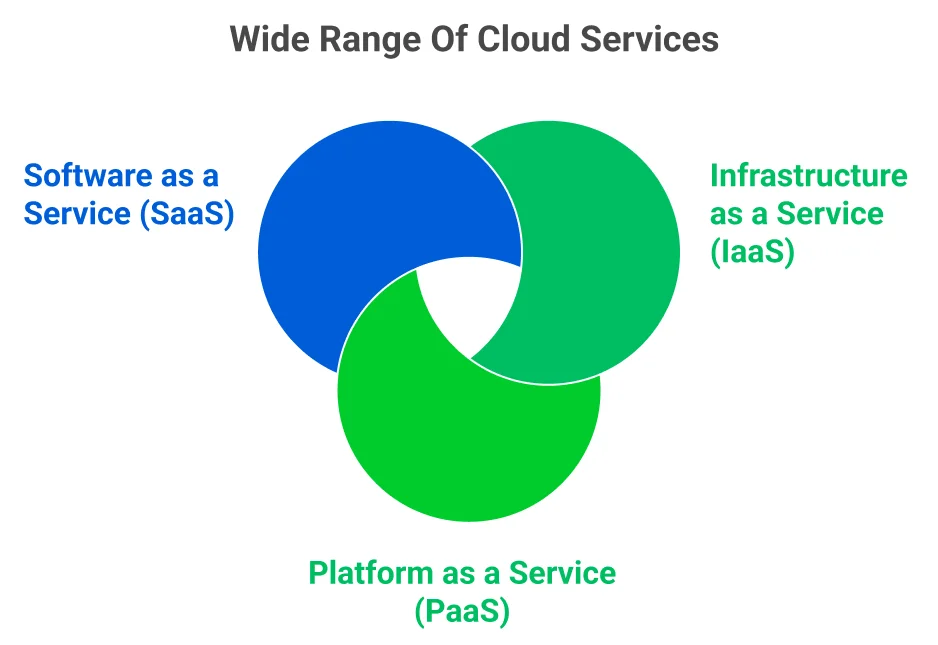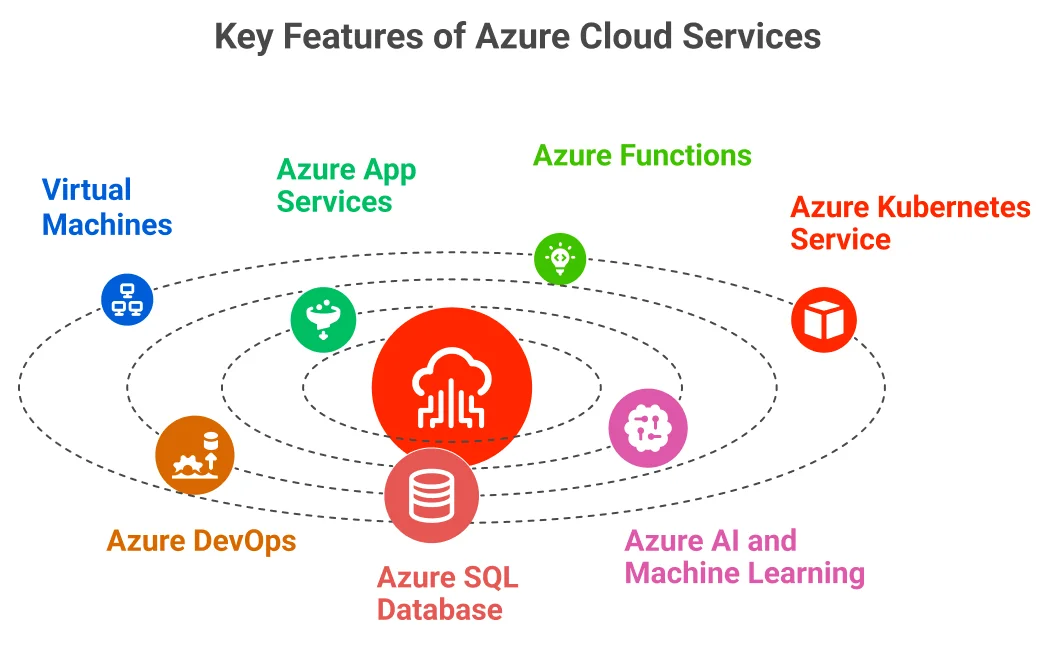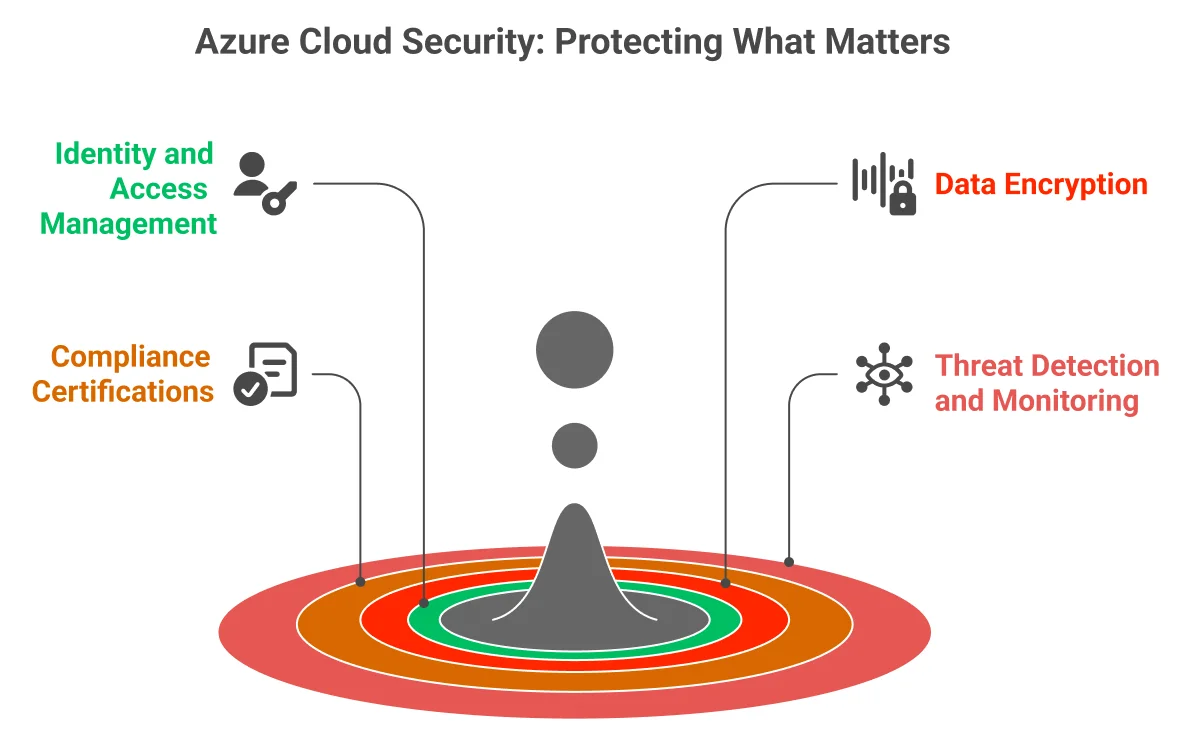Aug
Mastering Azure Cloud: A Complete Guide to Scalable, Secure, and Intelligent Cloud Solutions

Organizations today require more from their IT infrastructure, including speed, flexibility, scalability, and unrestricted security. Meeting the needed agility with rapid system changes using traditional systems is all but impossible and does not meet modern business requirements. Microsoft Azure offers Azure Cloud Services, a comprehensive set of cloud computing solutions. Supporting businesses of all sizes, Azure provides a secure and flexible platform for cloud application creation, deployment, and management. For modern businesses, launching new products, modernizing systems, and scaling Azure Cloud services is done globally, all while offering tools for intelligent and efficient action.
Azure Cloud Services enables organizations to stay enterprise cloud-secure while strengthening their global network, offering advanced capabilities deeply integrated with Microsoft products. For modern businesses, innovation is essential. Azure infrastructure management and advanced AI capabilities allow infrastructure to be managed, tools and features to be integrated, all while keeping costs low. Startups and enterprises alike benefit from cloud agility and IT ecosystem transformations geared toward their needs. This guide empowers understanding Microsoft Azure and leveraging their services.
What Are Azure Cloud Services?
Azure Cloud Services are a comprehensive suite of cloud computing solutions provided by Microsoft Azure, designed to help businesses run more efficiently in the digital age. These services include building, deploying, and managing applications. Managed through Microsoft’s network of secure, enterprise-grade data centers, Azure can replace on-premises servers and IT hardware with computing resources, storage, advanced networking, automated analytics, and artificial intelligence, all on demand. This innovative on-the-cloud business model minimizes the need for any physical investment. Microsoft Azure is well-equipped with cloud services to cater to all business needs, ranging from virtual machines, databases, containers, developer tools, machine learning, IoT integrations, and even more advanced enterprise applications. Azure Cloud Services confidently meets the expectations, whether for powerful computing resources to host a website, a very simple one, or to run complex applications.
Azure allows organizations to access a wide range of cloud services such as:
1. Infrastructure as a Service (IaaS)
Infrastructure as a Service, or IaaS, is the most foundational level of cloud computing. In this model, Microsoft Azure provides virtualized computing infrastructure over the internet — such as virtual machines, storage, and networking — while the customer is responsible for managing the operating system, applications, and data. Essentially, IaaS replaces the need for physical hardware in a traditional data center. It offers on-demand computing resources that are fully scalable and billed on a consumption basis.
Key Features of IaaS in Azure:
- Virtual Machines (VMs): Deploy and manage Windows or Linux-based virtual machines in minutes.
- Storage Options: Azure provides various storage types, including Blob Storage, Disk Storage, and File Storage, for unstructured and structured data.
- Networking Services: Create virtual networks, load balancers, and VPN gateways for secure communication and traffic management.
- High Availability and Scalability: Resources can be automatically scaled up or down based on usage patterns.
- Cost Efficiency: With pay-as-you-go pricing, businesses only pay for the infrastructure they actually use.
- Customizable Configuration: Full control over operating systems, software stacks, and configurations.
Why Use IaaS?
- Flexibility and Control: Ideal for companies that need to manage and customize their own applications, operating systems, and middleware.
- Rapid Deployment: Launch computing environments quickly without waiting for hardware procurement or setup.
- Cost Savings: Eliminates capital expense and reduces ongoing maintenance costs for physical infrastructure.
- Disaster Recovery: Easily replicate environments and ensure business continuity through Azure’s backup and recovery solutions.
- Test and Developmen: Developers can spin up test environments quickly without investing in hardware.
Use Case Example:
A software development company can use Azure’s IaaS offering to host a scalable development and testing environment. Instead of building an on-premises lab, they can deploy virtual machines, configure the OS, and install necessary development tools — all within a few hours. As the project scales, they can add more resources instantly.
2. Platform as a Service (PaaS)
Platform as a Service (PaaS) is a cloud computing model that provides a ready-to-use environment for developing, testing, deploying, and managing applications. In this model, Azure handles all the underlying infrastructure, including servers, operating systems, and networking, while developers focus solely on the application code and logic. PaaS is designed to simplify and accelerate the development process. It eliminates the complexities of managing infrastructure, allowing businesses to innovate and bring solutions to market more quickly.
Key Features of PaaS in Azure:
- Integrated Development Tools: Azure provides support for popular programming languages, development frameworks, and continuous integration tools.
- Managed Hosting: Azure automatically handles server provisioning, OS updates, patches, and load balancing.
- Database Services: Easily deploy and scale managed databases like Azure SQL Database, Cosmos DB, and MySQL.
- Built-in Security and Compliance: Applications hosted on Azure PaaS inherit the platform’s security features and compliance certifications.
- Auto-Scaling and Performance Monitoring: Applications can automatically adjust to user demand, with tools to monitor performance and errors.
Why Use PaaS?
- Faster Development Cycles: Developers can focus on writing code instead of configuring and maintaining infrastructure.
- Lower Operational Overhead: No need to manage servers or system updates — Azure handles it all.
- Streamlined Application Lifecycle: From development and testing to deployment and maintenance, the process is centralized and efficient.
- Ideal for Microservices and APIs: PaaS is well-suited for modern application architectures, including serverless computing and containerized applications.
- DevOps Integration: Azure DevOps and other tools are built into the platform, making CI/CD pipelines easy to implement.
Use Case Example:
A digital marketing agency building a client dashboard can use Azure App Service (a PaaS offering) to host their web application. They can develop and deploy their app directly from a GitHub repository, set up automatic scaling, and integrate with a managed SQL database — all without worrying about server maintenance or updates.
3. Software as a Service (SaaS)
Software as a Service (SaaS) is a cloud delivery model where users access fully developed software applications hosted by the service provider. In this model, Microsoft Azure (or a partner) provides everything — infrastructure, middleware, application software, and data — and users access the software via the internet, usually through a web browser. With SaaS, businesses can start using advanced software solutions immediately, without installation, configuration, or maintenance responsibilities.
Key Features of SaaS in Azure:
- Accessibility: Users can access the application from any device with an internet connection.
- Subscription-Based Pricing: Pay per user, per month, or based on usage, making it cost-effective for teams of all sizes.
- Automatic Updates and Patches: The service provider ensures that the software is always up to date.
- Data Backup and Security: Azure ensures data is stored securely and is regularly backed up.
- Multi-Tenant Architecture: A single instance of the software serves multiple customers, ensuring efficiency and scalability.
Why Use SaaS?
- Simplicity: No setup or infrastructure management is needed — users just log in and start working.
- Rapid Adoption: Ideal for organizations that need quick deployment with minimal IT involvement.
- Cost Control: Eliminates the need for licenses, hardware, and dedicated IT staff to manage the application.
- Remote Collaboration: Enables distributed teams to work together in real time from anywhere.
- Integration Capabilities: Many SaaS applications can connect with other tools and platforms used in business.
Use Case Example:
An organization looking to streamline internal communication and collaboration can subscribe to Microsoft 365, which includes Outlook, Teams, SharePoint, and OneDrive. All services are hosted on Azure and available through any web browser, with no installation or maintenance required by the IT department.
Why Choose Azure Cloud Services?
As digital transformation continues to reshape industries, choosing the right cloud computing platform becomes a critical business decision. Microsoft Azure has emerged as one of the leading cloud service providers in the world, known for its innovation, enterprise-grade performance, and commitment to security.
Here are several compelling reasons why businesses across the globe choose Azure Cloud Services to power their cloud journey:
1. Scalability
One of the standout features of Azure Cloud Services is its ability to scale applications and resources automatically based on real-time demand. Whether you’re running a small internal application or a large-scale enterprise solution accessed by millions of users globally, Azure’s infrastructure is built to scale seamlessly. Azure supports vertical and horizontal scaling, meaning you can increase the size of an existing resource (e.g., more RAM or CPU for a virtual machine) or add more instances to handle increased load. This elasticity is especially beneficial for businesses with fluctuating workloads or seasonal demand spikes. Moreover, with Azure’s pay-as-you-go pricing model, you only pay for what you use. This flexibility ensures optimal resource utilization and cost efficiency, making it ideal for startups, growing businesses, and large enterprises alike.
2. Security
Security is a core pillar of Azure’s cloud architecture. Azure Cloud Services offer a broad set of built-in cloud security features that help protect your data, applications, and infrastructure.
Some of the key security capabilities include:
- Azure Active Directory for identity and access management, ensuring only authorized users can access specific resources.
- Data encryption at rest and in transit using advanced encryption standards (AES-256).
- Azure Security Center provides continuous security assessments, advanced threat detection, and actionable recommendations.
- DDoS protection firewall services, and network security groups to guard against unauthorized access and attacks.
- Compliance with global regulations, including GDPR, HIPAA, ISO/IEC 27001, SOC 2, and more.
Azure invests over $1 billion annually in cybersecurity research and employs thousands of security experts to ensure their platform remains one of the most secure in the industry.
For organizations handling sensitive data—such as in finance, healthcare, or government—Azure’s robust security framework offers peace of mind and compliance readiness.
3. Global Reach
Microsoft Azure is a truly global platform with a vast network of data centers strategically located around the world. As of now, Azure operates in over 60+ regions and 200+ data centers, making it one of the largest cloud networks globally.
This broad geographic coverage provides several advantages:
- Lower latency: By deploying your services in a data center closest to your users, you can ensure faster load times and a better user experience.
- Geographic redundancy: Azure supports data replication and failover across regions, improving availability and resilience in the event of hardware failures or natural disasters.
- Regulatory compliance: Some businesses must store and process data within specific geographic boundaries. Azure allows you to choose data residency to meet legal or industry-specific requirements.
The global presence of Azure makes it an ideal choice for multinational corporations, SaaS providers, and e-commerce platforms serving international customers.
4. Integration with Microsoft Products
One of the key strengths of Azure is its deep integration with other Microsoft products and services. If your business already uses Microsoft solutions like Office 365, Dynamics 365, SharePoint, or Active Directory, adopting Azure will feel like a natural extension of your existing IT environment.
This integration brings several benefits:
- Single sign-on (SSO) capabilities through Azure Active Directory make it easy to manage user identities across multiple Microsoft services.
- Seamless data sharing between Azure and tools like Excel, Power BI, and SQL Server allows businesses to create end-to-end solutions without switching platforms.
- Unified ecosystem Developers can use Visual Studio and GitHub (also owned by Microsoft) to build, test, and deploy Azure-based applications quickly and efficiently.
- Improved productivity Employees benefit from a consistent user experience across apps, services, and devices, reducing the learning curve and improving workflow.
For organizations already invested in the Microsoft stack, Azure offers unmatched compatibility, reduced complexity, and enhanced operational efficiency.
Additional Advantages
While scalability, security, global reach, and Microsoft integration are among the most popular reasons businesses choose Azure, there are several other noteworthy benefits:
- Hybrid capabilities: Azure supports hybrid cloud deployments, allowing businesses to run workloads across on-premises environments and the cloud with consistency and control.
- Artificial Intelligence and Machine Learning tools: Azure provides pre-built AI models and powerful ML development environments to drive innovation.
- Developer-friendly environment: With support for multiple programming languages, frameworks, and open-source technologies, Azure appeals to diverse developer communities.
- Cost management tools: Azure Cost Management and Azure Advisor provide insights and recommendations to optimize cloud spending.
Key Features of Azure Cloud Services
Azure Cloud Services provide a broad set of tools and technologies that enable businesses to build, deploy, and manage applications at scale. Whether you’re developing a small internal app or a global enterprise solution, Azure offers capabilities designed to support high availability, security, performance, and innovation.
Below are some of the most powerful and widely used features of Microsoft Azure:
1. Virtual Machines (VMs)
Azure Virtual Machines allow you to deploy and run scalable, on-demand computing environments in the cloud. You can run both Windows and Linux-based applications, with full administrative access to configure the operating system, software stack, and storage options.
Key Benefits:
- Full control over configuration and maintenance.
- Support for custom images and multiple VM sizes.
- Easily scalable based on workload demands.
- Integration with load balancers and virtual networks for enterprise use.
Use Case: Ideal for hosting applications, migrating legacy systems, running development/test environments, or setting up virtual desktops.
2. Azure App Services
Azure App Services provide a fully managed platform for building and hosting web and mobile applications. It simplifies the development lifecycle by handling infrastructure management, patching, and scaling automatically.
Key Benefits:
- Built-in support for .NET, Java, PHP, Python, and Node.js.
- Integration with DevOps tools for continuous deployment.
- Autoscaling and high availability across multiple regions.
- Built-in security, authentication, and monitoring.
Use Case: Perfect for developers looking to build scalable web apps or APIs without managing backend infrastructure.
3. Azure Functions
Azure Functions is a serverless compute service that lets you run code in response to events without provisioning or managing servers. It’s designed to handle short-lived tasks triggered by events such as HTTP requests, file uploads, or database changes.
Key Benefits:
- Automatically scales based on demand. /li>
- Cost-effective: pay only for execution time and resources used.
- Supports multiple programming languages.
- Seamless integration with other Azure services and external systems.
Use Case: Ideal for automating workflows, building event-driven microservices, and responding to triggers in real time (e.g., sending notifications or processing files).
4. Azure Kubernetes Service (AKS)
Azure Kubernetes Service provides a managed Kubernetes environment to deploy, scale, and operate containerized applications. AKS reduces the complexity of container orchestration by handling critical tasks such as cluster management, upgrades, and monitoring.
Key Benefits:
- Simplified Kubernetes deployment and management.
- Integrated monitoring and logging through Azure Monitor.
- Built-in security and compliance controls.
- Automatic scaling and self-healing clusters.
Use Case: Suitable for businesses running modern microservices architectures, CI/CD pipelines, or applications requiring scalability and high availability.
5. Azure DevOps
Azure DevOps is a suite of tools and services that support the entire software development lifecycle — from planning and coding to testing, release, and monitoring. It helps teams adopt agile practices and automate the development process.
Key Benefits:
- Integrated tools for source control, build pipelines, and release management.
- Agile planning with work item tracking and boards.
- Test automation and reporting capabilities.
- Seamless integration with GitHub and other CI/CD tools.
Use Case: Ideal for development teams that want to accelerate release cycles, enforce quality control, and improve collaboration across projects.
6. Azure SQL Database
Azure SQL Database is a fully managed relational database-as-a-service (DBaaS) built on Microsoft SQL Server. It offers intelligent performance optimization, built-in security, and global scalability without the administrative overhead.
Key Benefits:
- Automatic tuning and scaling based on workload.
- Advanced threat detection and data encryption.
- High availability with 99.99% uptime SLA.
- Supports serverless and hyperscale models.
Use Case: Great for hosting business-critical applications, e-commerce platforms, and enterprise databases with minimal management effort.
7. Azure AI and Machine Learning
Azure offers a comprehensive suite of AI and Machine Learning (ML) tools that enable developers and data scientists to build intelligent applications. These services can be used for tasks like image recognition, natural language processing, predictive analytics, and more.
Key Benefits:
- Pre-built models for vision, speech, language, and decision-making.
- Azure Machine Learning Studio for custom model training and deployment.
- Scalable infrastructure for training large datasets.
- Integration with other Azure services like Data Factory and Synapse Analytics.
Use Case: Ideal for companies looking to enhance customer experiences through chatbots, recommendation systems, automated insights, or AI-powered automation.
How Azure Enhances Cloud Computing
At its core, cloud computing refers to the delivery of computing resources—such as servers, storage, databases, networking, and software—over the internet. This model eliminates the need for businesses to own and maintain physical data centers or servers, offering greater flexibility and reduced capital expenses.
Azure Cloud Services takes traditional cloud computing several steps further by combining flexibility, scalability, and intelligence into a single unified platform. Here’s how Azure enhances the cloud experience for modern businesses:
1. On-Demand Access to Resources
Azure offers on-demand provisioning of virtual machines, storage, databases, and more. Resources can be scaled instantly to match workload requirements, ensuring high performance without unnecessary costs.
2. Flexible Pricing Models
Azure provides various pricing options to meet the needs of different organizations. From pay-as-you-go billing to reserved instances and spot pricing, businesses can choose the model that aligns with their budget and usage patterns.
3. Seamless Integration with On-Premises Infrastructure
Azure supports hybrid environments, enabling organizations to integrate their existing on-premises systems with Azure’s cloud resources. Services like Azure Arc and Azure Stack help extend Azure’s capabilities across on-premises, edge, and multi-cloud environments.
4. Hybrid Cloud Capabilities
Azure stands out for its robust hybrid cloud support. Businesses can maintain critical workloads on-premises while extending other functions to the cloud. This flexibility is essential for industries with regulatory requirements or latency-sensitive operations.
5. Enterprise-Grade Security
Azure is designed with built-in security across every layer. From identity management and encryption to advanced threat protection, Azure helps safeguard data and applications with one of the most comprehensive security offerings in the industry.
Together, these capabilities make Azure not just a cloud platform, but a complete solution for building agile, intelligent, and secure business systems.
Azure Cloud Security: Protecting What Matters
As organizations move to the cloud, security becomes a central concern—and rightfully so. Cyber threats are evolving rapidly, and data breaches can have serious financial and reputational consequences.
Microsoft Azure addresses these concerns head-on with a security-first architecture that provides protection at every level—from the infrastructure to the applications.
1. Identity and Access Management (IAM)
Azure provides centralized identity management through Azure Active Directory (AAD). This service allows organizations to manage user accounts, enforce multi-factor authentication, and implement role-based access control (RBAC), ensuring that only authorized personnel can access specific resources.
2. Data Encryption
Azure ensures that all data is encrypted both at rest and in transit using industry-standard encryption protocols like AES-256. Customers also have the option to manage their own encryption keys for enhanced control and compliance.
3. Compliance Certifications
Azure is compliant with over 90 global regulatory and industry standards, including:
- GDPR (General Data Protection Regulation)
- HIPAA (Health Insurance Portability and Accountability Act)
- ISO/IEC 27001, 27017, 27018
- SOC 1, 2, and 3
These certifications demonstrate Azure’s commitment to maintaining high standards in data privacy, integrity, and accountability.
4. Threat Detection and Monitoring
With tools like Azure Security Center and Microsoft Defender for Cloud, Azure offers real-time monitoring, advanced threat detection, and automated incident response. These services analyze billions of signals daily to detect potential threats and provide actionable recommendations for mitigating risks.
Whether you’re storing sensitive financial data or managing critical infrastructure, Azure’s layered security architecture provides the trust and reliability modern enterprises require.
Industries That Benefit from Azure Cloud Services
Azure Cloud Services are designed to meet the diverse needs of various industries. Its flexibility, compliance-readiness, and powerful data capabilities make it an ideal cloud platform for digital transformation across sectors.
1. Healthcare
Hospitals and healthcare providers use Azure to:
- Store and protect patient health records in compliance with HIPAA.
- Enable telemedicine applications for remote patient care.
- Use machine learning to analyze diagnostic data and improve patient outcomes.
- Streamline hospital management through data integration and predictive analytics.
2. Financial Services
Banks, insurance companies, and fintech firms trust Azure for:
- Secure data storage and regulatory compliance (GDPR, PCI DSS).
- Fraud detection using real-time analytics and AI models.
- Running core banking applications and mobile platforms.
- Performing high-speed financial calculations and risk analysis.
3. Retail
Retailers leverage Azure to improve operations and customer experience:
- Use customer data analytics to create personalized shopping experiences.
- Optimize inventory and supply chain with real-time tracking.
- Deploy e-commerce platforms with scalable cloud infrastructure.
- Integrate AI-powered chatbots for customer service.
4. Manufacturing
Manufacturing companies utilize Azure to modernize production:
- Run IoT-based monitoring systems for real-time equipment tracking.
- Use predictive maintenance to reduce downtime and repair costs.
- Enable digital twins to simulate and optimize production workflows.
- Improve supply chain visibility across global operations.
These examples only scratch the surface. Azure’s broad service catalog and industry-specific solutions make it adaptable for nearly every field, including education, energy, transportation, logistics, public sector, and more.
Common Use Cases for Azure Cloud Services
Azure Cloud Services support a wide variety of use cases across industries, business sizes, and technical requirements. Whether you’re building a simple web application or deploying enterprise-scale analytics, Azure provides the flexibility and tools needed to succeed.
Below are some of the most popular and impactful ways organizations use Azure in real-world scenarios:
1. Web Application Hosting
Azure App Services provide a fully managed platform for building and hosting web applications. With built-in auto-scaling, high availability, and deployment tools, developers can focus on writing code while Azure handles the infrastructure.
Key Benefits:
- Supports multiple programming languages and frameworks (e.g., .NET, Java, Python, PHP).
- Built-in CI/CD pipelines with GitHub and Azure DevOps.
- Load balancing and automatic failover for uninterrupted service.
- Integration with custom domains, SSL certificates, and authentication services.
Use Case Example: A startup launches a SaaS product with global users and scales easily as user demand grows, without worrying about server maintenance.
2. Data Analytics and Business Intelligence
In today’s data-driven world, businesses need actionable insights to remain competitive. Azure provides advanced analytics tools like Azure Synapse Analytics, Power BI, and Azure Data Lake for end-to-end data processing and visualization.
Key Benefits:
- Ingest, store, and analyze large volumes of structured and unstructured data.
- Real-time analytics with seamless integration into business dashboards.
- Predictive modeling and machine learning integration.
- Compliance-ready data storage and governance tools.
Use Case Example: A retail chain analyzes customer purchasing behavior across hundreds of stores to optimize inventory, improve customer experience, and forecast demand.
3. Disaster Recovery and Business Continuity
Azure Site Recovery (ASR) enables businesses to maintain availability during system failures, outages, or natural disasters. It offers real-time replication, automated failover, and minimal recovery time objectives (RTOs).
Key Benefits:
- Geo-redundant backup across Azure’s global data centers.
- Orchestrated disaster recovery plans with automatic testing.
- Encryption and compliance-ready backup solutions.
- Pay-as-you-use pricing without costly hardware investments.
Use Case Example: A healthcare provider uses ASR to ensure patient data and medical records are continuously protected and recoverable in the event of a cyberattack or data center failure.
4. Remote Work and Virtual Desktops
Azure Virtual Desktop (AVD) provides secure, cloud-based desktop and application access, ideal for supporting remote and hybrid workforces. It allows employees to access their entire work environment securely from anywhere.
Key Benefits:
- Centralized management and policy control for remote endpoints.
- Multi-session Windows 10/11 and Microsoft 365 integration.
- Scalable infrastructure to support hundreds or thousands of users.
- Optimized for performance and cost-efficiency.
Use Case Example: A financial firm sets up virtual desktops for analysts working from different countries, ensuring secure access to sensitive financial systems with centralized control.
Azure vs. Other Cloud Providers
When comparing Azure to competitors like Amazon Web Services (AWS) and Google Cloud Platform (GCP), it’s clear each platform has its strengths. However, Azure offers several strategic advantages, especially for businesses operating in hybrid environments or already using Microsoft products.
Let’s break down some key differentiators:
1. Seamless Integration with Windows and Microsoft Ecosystem
Azure stands out for its tight integration with Microsoft software and services such as Windows Server, Active Directory, SQL Server, Office 365, and Dynamics 365. For organizations already using Microsoft tools, Azure provides a more natural and cost-effective transition to the cloud.
2. Industry-Leading Hybrid Cloud Capabilities
Azure leads in hybrid cloud deployments with services like Azure Arc, Azure Stack, and Hybrid Benefit licensing. This allows businesses to run applications across both on-premises and cloud environments, a flexibility not as robustly supported by AWS or GCP.
3. Enterprise-Grade Support and SLAs
Azure provides robust support packages and 99.99%+ uptime SLAs, making it highly reliable for mission-critical enterprise workloads. Its global presence and deep enterprise relationships give Azure a strategic edge in corporate environments.
4. AI and Machine Learning Ecosystem
Azure offers a wide range of AI and machine learning services, from drag-and-drop tools for citizen developers to enterprise-scale ML infrastructure for data scientists. Services like Azure OpenAI, Cognitive Services, and Azure ML Studio position it as a leader in intelligent cloud platforms.
5. Global Reach and Compliance
Azure operates in more geographic regions than AWS or GCP, giving organizations the ability to deploy applications closer to end-users while complying with local data residency laws and industry-specific regulations.
Best Practices for Using Azure Cloud Services
To get the most out of Azure Cloud Services, it’s essential to follow proven best practices that help manage costs, maintain security, and ensure long-term performance. Below are key strategies for optimizing your Azure experience:
1. Use Role-Based Access Control (RBAC)
Assign roles and permissions based on users’ responsibilities. This principle of least privilege ensures that users have access only to the resources they need, reducing security risks and improving governance.
2. Implement Resource Tagging
Tags help you organize, manage, and monitor Azure resources effectively. Use tags to group resources by project, department, environment (dev/test/prod), or cost center. This is especially useful for budgeting and reporting.
3. Enable Autoscaling
Many Azure services support autoscaling based on CPU usage, memory load, or scheduled times. This ensures you always have the resources you need during peak demand and can scale down during off-hours to reduce costs.
4. Monitor Costs and Budgets
Use Azure Cost Management + Billing to set budgets, track spending trends, and forecast future expenses. Implement alerts to notify stakeholders when usage exceeds defined thresholds.
5. Use Azure Monitor and Application Insights
For real-time visibility into application performance, Azure Monitor and Application Insights offer powerful telemetry tools. These services help identify bottlenecks, reduce downtime, and optimize user experiences by tracking key metrics and logs.
6. Regularly Audit and Update Security Policies
Stay compliant by regularly reviewing your security posture using tools like Microsoft Defender for Cloud. Use Azure Policy to enforce governance rules, and perform regular vulnerability assessments to identify and patch risks.
Conclusion
Azure Cloud Services offer more than just infrastructure — they provide a complete platform for digital transformation, innovation, and long-term growth. With unmatched integration into the Microsoft ecosystem, strong hybrid capabilities, and industry-leading security features, Azure has become a go-to choice for organizations seeking scalable, secure, and intelligent cloud solutions. Whether you’re hosting applications, analyzing big data, enabling remote work, or modernizing your IT infrastructure, Azure delivers the flexibility and power to drive results.
Frequently Asked Questions
Azure stands out for its strong hybrid cloud capabilities, enterprise-grade security, and seamless integration with Microsoft products. It also offers over 200 services covering AI, analytics, IoT, and DevOps.
Azure follows a multi-layered security model with encryption, identity management, and threat detection. It also meets global compliance standards like GDPR, HIPAA, and ISO certifications, making it suitable for regulated industries.
Yes. Azure offers scalable plans, pay-as-you-go pricing, and tools that allow even startups and small businesses to access enterprise-level technology without heavy upfront investments.
Azure provides auto-scaling for applications, load balancing, and elastic virtual machines. These features ensure performance consistency, even during peak traffic or seasonal demands.
Azure offers pre-built AI services like Azure Cognitive Services and Azure Machine Learning. These help businesses deploy intelligent chatbots, predictive models, and natural language solutions quickly.
Enterprises use Azure for hosting applications, migrating legacy systems, managing big data, implementing disaster recovery, running DevOps pipelines, and enabling remote work solutions.
Yes. Through Azure Arc and hybrid solutions, businesses can extend cloud capabilities to on-prem environments, allowing seamless management across both infrastructures.
With Azure’s pay-as-you-go and reserved instance options, businesses avoid large upfront hardware costs. It also reduces ongoing maintenance expenses, making it more cost-efficient than traditional data centers.
Azure Site Recovery and Backup services ensure data redundancy and rapid failover. This allows businesses to quickly restore operations in case of outages or natural disasters.
Azure provides tools like Azure Monitor, Cost Management, and Application Insights. These help track resource consumption, identify inefficiencies, and optimize spending in real-time.







